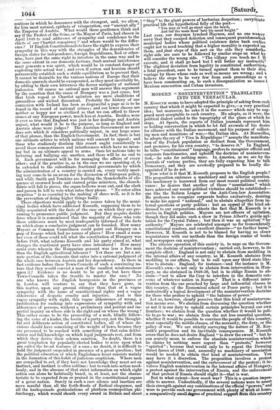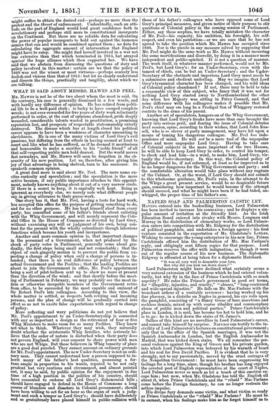MODERN " NONINTERVENTION " TRANSLATED INTO THE VERNACULAR.
M. Koss= seems to have adopted the principle of asking from each country that which it might be expected to give,—a very practical idea ; but moreover, he asks it in the manner which may be sup- posed most acceptable to each country. He adopts, as it were, the political dialect suited to the topography of the place at which he stops. At Spezia, the reports of Italian journals represent him as holding conversation in which he let fall avowals of his desire for alliance with the Italian movement, and his purpose of collect- ing men and munitions of war,—the Italian idea. At Marseilles, he adopts the cry of "'five la Republique !" accepts the manifesta- tion of the French population as distinct from the Government, and promises, for his own country, " to deserve it." In England, he talks "constitutional" language,prefers to recognize official and corporate functionaries, and upholds" the doctrine of noninterven- tion,—he asks for nothing more. In America, as we see by the journals of various parties, they are fully expecting him to talk Democracy, and they are avowedly prepared to be loudly dis- appointed if he do not.
Now what is it that M. Kossuth proposes to the English people ? His proposition embraces a machinery and an ulterior operation. His machinery is borrowed from our most recent political contri- vance : he desires that another of those " associations " which have achieved our recent political victories should be established— one like the Reform League or the Anti-Corn-law Association. He professes to recognize corporate bodies exclusively, desiring to make his appeal "national, and to abstain altogether from in- ternal questions or party politics : but an appeal of the kind ad- dressed to our corporations attests the fact that M. Kossuth is 'a novice in English politics. Mayors are not officers of agitation, though they did make such a show in Prince Albert's gentle agi- tation for the Crystal Palace ; but then it was an agitation " by authority." Mayors are celebrated amongst us for tremendously constitutional resolves, and excellent dinners—" no further harm.' However, M. Kossuth is not to be blamed for having no closer acquaintance with our methods than the foreign reader of books and newspapers can acquire. The ulterior operation of this society is, to urge on the Govern- ment the doctrine of nonintervention ; carried out, however, to its complete effect : England is not only to abstain from meddling in the internal affairs of any country, as M. Kossuth abstains from meddling in our affairs, but is to call upon any third state like- wise to abstain : England, for instance—and the instance is M. Kossuth's own—is not only to abstain from intervention in Hun- gary, as she abstained in 1848-50, but is to oblige Russia to ab- stain—" not to allow the Czar to interfere in the domestic con- cerns of whatever nation in Europe." That is a different inter- vention from the one preached by large and influential classes in this country, of the Economical school or Peace party; but it is undoubtedly a logical development of the nonintervention doctrine for those who profess to uphold " the balance of power." Let us, however, clearly perceive that this kind of noninterven- tion means war. We abstain from discussing the question whether or not it is our duty to uphold certain principles beyond our own frontiers ; we abstain from the question whether it would be poli- tic to go to war ; we abstain from the not less essential question, whether it would be possible to convince the people of this country, most especially the middle classes, of the necessity, the duty, or the policy of war. We are strictly surveying the nature of M. Kos- suth's proposition and its inevitable consequences. M. Kossuth avers that he does not desire England " to draw the sword " : but he can scarcely mean to enforce the absolute nonintervention which he claims by nothing more cogent than " protests," however " spirited" ; because that would only be to repeat the Downing Street farces of 1848; and, assuredly no machinery of association would be needed to obtain that kind of nonintervention. You may have it a discretion. The proposition involves a protest against nonintervention, and the enforcement of the protest; it in- volves English nonintervention in the internal affairs of Hungary, a protest against the intervention of Russia, and the enforcement of that protest if Russia should slight it—that is war. But to what extent—how much war? This is a question impos- sible to answer. Undoubtedly, if the several nations were to assert their strength against any combinations of the official "powers," and were to provide each one government with plenty of work at home, a comparatively small degree of practical suppoit Nom this country
might suffice to obtain the desired end—perhaps no more than the protest and the threat of enforcement. Undoubtedly, such an atti- tude on the part of England would lend great confidence both to revolutionary and perhaps still more to constitutional insurgents on the Continent. But there are no reliable data for calculating the power of popular insurgents to hold out against the immense armies that can and would be combined against them ; no data for calculating the aggregate amount of intervention that England might have to estop. She might find herself involved in a war not less extensive than that which terminated in 1815, but arrayed against the huge alliance which then supported her. We have said that we abstain from discussing the questions of duty and policy involved in this matter : certain are we that the policy of 1848 was not the wisest or most virtuous—perhaps scarcely less foolish and vicious than that of 1815: but let us clearly understand and discern the things, practically and tangibly, about which we are talking.



























 Previous page
Previous page